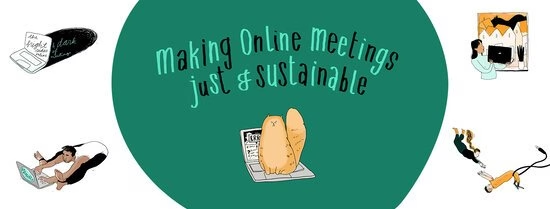With or without the COVID-19 pandemic, online meetings are here to stay. However, physical distancing does not (need to) mean social distancing, as we can use the online universe to sustain and nurture our social connections. By gathering all the knowledge from previous experiences and initiatives that have invested a lot of time in social innovation, we have written a “Guide for Virtual Hosting” to delve into the question of how to make online meetings just and sustainable.
Online meetings inherently have a sustainability component to them, such as reducing a considerable amount of CO2-emissions and other unintended hazardous impacts by not travelling. Yet, sustainability is more than tackling environmental issues. We believe there are social elements such as the human connection that need more attention in order to get the best out of online meetings in the future.
What will you find in this guide?
Rather than writing an ultimate guide on how to host online meetings, we are sharing experiences and reflections from our journey in order to provide tools to experiment with them and try new strategies in the future. Everyone who is interested in this medium will find within these sections our top strategies to host online meetings, some specific tools, as well as resources/articles to expand the knowledge beyond this guide. Furthermore, we invite the reader to reflect upon some of the dilemmas we have encountered (and still have) during our journey.
10 strategies to host virtual meetings
We believe that unlocking the potential benefits of online meetings is currently more a matter of social innovation than technological innovation. Even if technology is a necessary condition to create online connections, it is not enough: we also need alternative ways of doing, thinking and organizing to make optimal use of the existing technology. This is why these strategies are about engaging participants, using offline elements, and much more.
Tools to improve the online experience
In this section, we dive into some of the most useful online tools and platforms we have tried, but also some that we will experiment with in the future. Here we provide different ways to ‘break the ice’ and relieve the tension at the beginning of online meetings, collaborate together during meetings, and last but not least, the script we use to have a clear structure of what would and should happen during our events/meetings.
Dilemmas within the online world
Two of the questions we covered during our webinar on Making Online Meetings Just and Sustainable were the following: ‘What are some important dilemmas to take into account regarding virtual hosting for justice?’ and ‘What are the main challenges for online meetings to contribute to #justsustainabilitytransitions?’. Although we do not have the answers to the wicked problems we found through the latter questions, we invite the reader to reflect on them and help us find alternative solutions. Some of these dilemmas include the digital divide between the ones who do (not) have access to online meetings, the dominant position of large companies (e.g., Zoom, Google, Microsoft) in the market over alternatives solutions that are more sustainable, and how to deal with language barriers when including participants across the world.
Looking ahead
As a final section, we took the liberty to take a step forward and talk about the potential of blended meetings for just sustainability transitions. Although little by little we are going back to physical meetings, many people have discovered the advantages of being connected through the online world. Hybrid meetings will become mainstream in the future, and therefore more challenges to solve will come. As a final remark of this guide, we included an epilogue to reflect on unequal power relations within online meetings. We believe that making online meetings more just and sustainable requires questioning power structures and recognizing that people who participate directly or indirectly have unequal positions and diverse interests and values.
This guide was a collaboration between the Vital Cities & Citizens (VCC) Erasmus Initiative, the Dutch Research Institute for Transitions (DRIFT), the Erasmus School of Social and Behavioral Sciences (ESSB), the Urban Arena on Sustainable and Just Cities (UrbanA) and ICLEI-Local Governments for Sustainability. Furthermore, this was the result of gathering the insights from the 4th event in the event series on Just Sustainability Transitions, where participants from different parts of the world joined to share their insights and experiences with online meetings. As we know that ‘a picture is worth a thousand words’, we invited the artist Menah Wellen to fill all the pages with beautiful illustrations and help us explain each section.
How to stay connected?
The #JustSustainabilityTransitions team has several mediums to keep in touch with you. We invite everyone that is (or wants to be) working on the intersections of justice, sustainability, and transformative change, to join our mailing list and social media accounts (LinkedIn | Twitter | Instagram | Linktr.ee).
About the author
Franco Crudi is working as a research assistant for the Vital Cities & Citizens Erasmus initiative on the sub-theme Sustainable and Just Cities. He holds an MSc in Urban Studies from Malmo University (Sweden) and an MA in Architecture from the National University of Cordoba (Argentina). His research interests include sustainability transitions, social innovation, and justice.
- More information
Vital Cities and Citizens
With the Erasmus Initiative Vital Cities and Citizens, Erasmus University Rotterdam wants to help improve the quality of life in cities. In vital cities, the population can achieve their life goals through education, useful work and participation in public life. The vital city is a platform for creativity and diversity, a safe meeting place for different social groups. The researchers involved focus on one of the four sub-themes:• Inclusive Cities and Diversity
• Resilient Cities and People
• Smart Cities and Communities
• Sustainable and Just CitiesVCC is a collaboration between Erasmus School of Social and Behavioural Sciences (ESSB), Erasmus School of History, Culture and Communication (ESHCC) and International Institute of Social Studies (ISS).
- Related content

